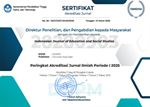Adeoye, M. A. (2025). Integration of Islamic Thought and Scientific Knowledge in the Formation of Educational Institution Leadership. TATHO: International Journal of Islamic Thought and Sciences, 141–152. https://doi.org/10.70512/tatho.v2i2.85
Adeoye, M. A., & Munawwaroh, I. (2025). Transformational Leadership in Education: Harmonising Accountability, Innovation and Global Citizenship. Kharisma: Jurnal Administrasi Dan Manajemen Pendidikan, 4(1), 14–30. https://doi.org/10.59373/kharisma.v4i1.68
Albustomi, A. Y. (2025). The Significance of Spiritual Leadership in Redefining the Culture of Sustainable Quality: The Process of Internalizing Values. TIME Journal: Transformation of Islamic Management and Education Journal, 2(1), 41–51.
Aqodiah, Astini, B. I., & Hasanah, N. (2024). The Effectiveness of School Principal Leadership in Implementing the Independent Curriculum (Case Study at MIN 1 Mataram). Attadib: Journal of Elementary Education, 8(3). https://doi.org/10.32832/at-tadib.v8i3.19425
Arifin, S., Chotib, M., Rahayu, N. W. I., Hosaini, H., & Samsudi, W. (2024). Kiai’s Transformative Leadership in Developing an Organizational Culture of Islamic Boarding Schools: Multicase Study. AL-ISHLAH: Jurnal Pendidikan, 16(2), 2608–2620. https://doi.org/10.35445/alishlah.v16i2.5325
Aslamiyah, M., & Fauzi, A. (2025). National Education Paradigm Ahmad Tafsir Perspective. Paradigma, 22(1), 219–240. https://doi.org/10.33558/paradigma.v22i1.10464
Ataman, A., & Safitri, S. D. (2024). Exploring complementary leadership styles in madrasahs by aiming at their impact on integrity and character development. Business and Applied Management Journal, 1(2), 118–133. https://doi.org/10.61987/bamj.v1i2.487
Azizah, R. N. (2024). Leadership Strategies of Msdrasah Principals in Improving the Quality of Islamic Education in Nganjuk Regency. JTP : Journal of Learning Technology, 1(1), 171–189.
Basri, H., Manshur, U., & Suhermanto, S. (2024). Exploring Charismatic Leadership and Personality Competence: Keys to Fostering Teacher Motivation: English. Bidayatuna Jurnal Pendidikan Guru Mandrasah Ibtidaiyah, 7(2), 109–120. https://doi.org/10.54471/bidayatuna.v7i2.2983
EnungRohaemi, R. S. (2025). the Role of Madrasah Heads in Improving Teacher Professionalism Through Islamic Education. JKPI: Jurnal Konseling Pendidikan Islam, 6(1), 346–360.
Gitmiwati, G., & Indrayuda, I. (2024). Transformation of Learning in Madrasah through Innovations in Developing Environmental Care Character for Future Generations. Al-Ishlah: Jurnal Pendidikan, 16(4), 4349–4362.
Herliana, P., Suriansyah, A., & Aslamiah. (2025). Green leadership and environmental awareness growing with Indonesia’s Adiwiyata Program at a Kotabaru school. Issues in Educational Research, 35(3), 987–1009.
Ibrahim, A., Rami, A. A. M., Isa, M. F. M., & Olaitana, A. A. (2025). Spiritual leadership among youth: Fostering sustainable development towards Islamic values. Multidisciplinary Reviews, 8(10), 1–10. https://doi.org/10.31893/multirev.2025327
Mahmud, M. E., & Ramli, A. (2025). Islamic Spiritual Leadership Model to Enhance Madrasah Quality Culture and Achieve Sustainable Development Goals. Al-Hayat: Journal of Islamic Education, 9(3), 628–643. https://doi.org/10.35723/ajie.v9i3.132
Muslim, B., & Kunta, I. H. (2025). Kepemimpinan Emosional sebagai Faktor Kunci dalam Pengambilan Keputusan Pendidikan dan Peningkatan Kualitas Pembelajaran. Naafi: Jurnal Ilmiah Mahasiswa, 1(5), 718–726. https://doi.org/10.62387/naafi.v1i5.236
Mustafazada, A. (2024). Adapting To Change in the Modern World: Skills Development in Higher Education for Economic and Sustainability Issues. Agora International Journal of Economical Sciences, 18(1), 132–143. https://doi.org/10.15837/aijes.v18i1.6717
Nasution, S., & Ismail, I. (2025). Literature Review terhadap Strategi Pendidikan Karakter dalam Perspektif Islam. Jurnal Teologi Islam, 1(2), 94–102.
Obani, I. P., & Izu-Obani, Z. (2025). Global Education Policies and Their Influence on Environmental Sustainability. Journal of Integrity in Ecosystems and Environment, 3(2), 1–24.
Pepilina, D., Sumarno, S., Hilaluddin, H., & Safei, S. (2024). Manajemen Kepemimpinan Transformasional dalam Lembaga Pendidikan Islam: Tinjauan Konseptual dan Literatur. Ath-Thalib: Jurnal Mahasiswa STIT Tanggamus, 2(1), 66–71.
Prasetia, I., Pratiwi, S. N., Harfiani, R., Sugesti, T., & Novia Siregar, A. (2024). Teacher mobilizers: the power of leading learning and mobilizing teacher communities. Frontiers in Education, 9(January), 1–12. https://doi.org/10.3389/feduc.2024.1471138
Qushwa, F. G. (2024). Patronage of Kyai Leadership in Building Parental Choice in Islamic Boarding Schools. Mapendis: Jurnal Manajemen Pendidikan Islam, 2(1), 44–56.
Shahin, B., Rowan, S., Mazloum, T., & Kawar, N. (2024). Effective Leadership and Its Impact on the Educational Community. Journal of Educational Leadership in Action, 9(2). https://doi.org/10.62608/2164-1102.1150
Thohir, P. F. D. M. (2024). Strengthening the Reputation of Islamic Boarding Schools: The Role of Leadership, Educational Innovation, and Local Wisdom. Managere: Indonesian Journal of Educational Management, 6(3), 331–346. https://doi.org/10.52627/managere.v6i3.720
Tohet, M. (2024). Gender Awareness in Building Self-Efficacy in Student Organization Leadership at School. Journal of Educational Management Research, 3(1), 71–84.
Waruwu, S. Y., Zalukhu, I. F. N., Zalukhu, Y., & Harefa, H. O. N. (2025). Peran Kepemimpinan Kepala Sekolah dalam Meningkatkan Kualitas Pembelajaran di Sekolah. Ainara Journal (Jurnal Penelitian Dan PKM Bidang Ilmu Pendidikan), 6(2), 293–301. https://doi.org/10.
 (Universitas Islam Negeri Raden Intan Lampung)
(Universitas Islam Negeri Raden Intan Lampung) 



